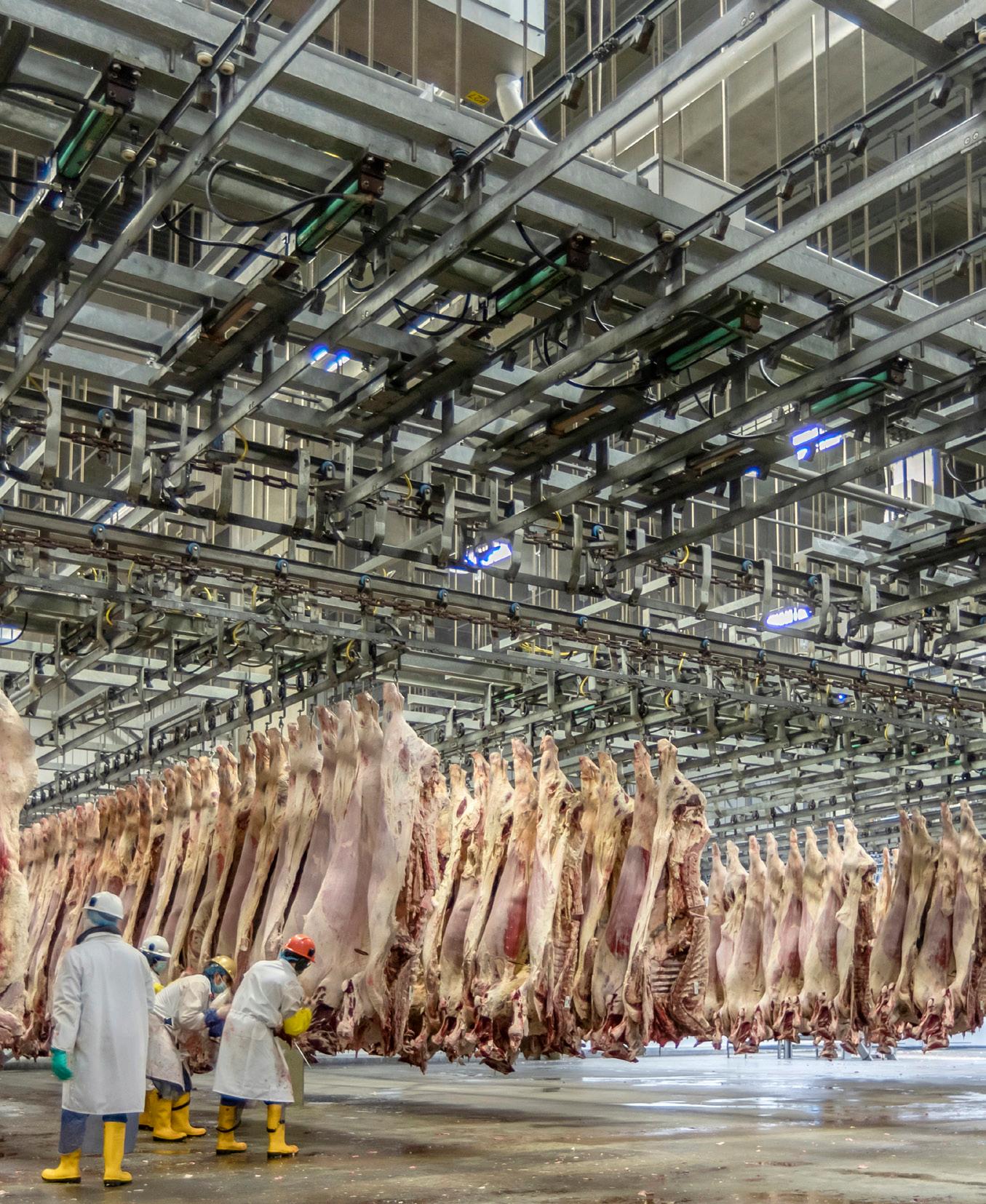
11 minute read
MANUFACTURING OPPORTUNITIES
The staff at DemKota Ranch Beef in Aberdeen have processed just over 300,000 head of cattle annually over the past two years.
an inside look at the DemKota you haven’t heard about.
Advertisement
by JENNY ROTH
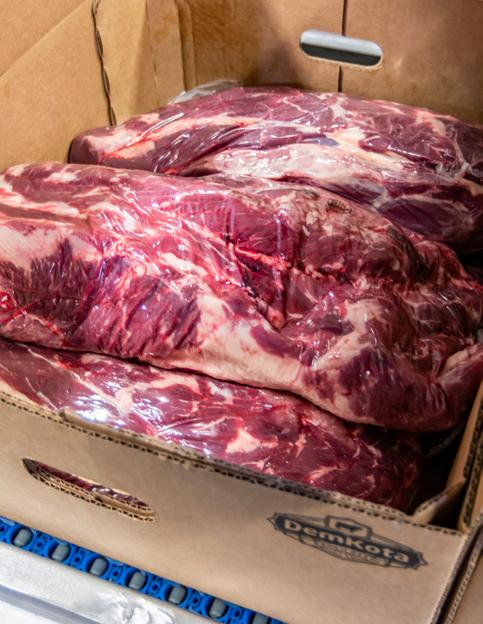
A view overlooking the production area at DemKota shows just how much human power is needed at every level of processing. DemKota beef is recognized locally, nationally, and around the world for being a high-quality product.
Inever imagined that I would work at DemKota,” recalled Marketing and Customer Service Manager Richelle Braun. “Then, I went on a tour of the facility and saw firsthand how everyone here worked together,” she continued. “It was like art.”
By the time that tour was over, the lifelong Aberdeen resident had changed her mind.
“I was just in awe of the employees and what they could do, and how they took time to wave and smile at me, a stranger, as I walked by. After that, I knew I was going to work here,” she said.
Richelle’s experience of getting to know DemKota might surprise you. If I’m honest, it would have surprised me before visiting the beef processing plant back in January.
Like many of you reading this, I had always thought of DemKota as separate from the rest of Aberdeen. The large, windowless building on the outskirts of town, surrounded by a chainlink fence, doesn’t exactly give a “Welcome! We’re glad you’re here!” first impression when you drive by.
This, combined with the challenges the plant faced when it was getting up and running, and stories that turn up in the rumor mill, and it’s easy to automatically assume it’s a place you wouldn’t want to be.
Then, we got the chance to go inside and see what DemKota is about for ourselves. The pictures on these pages and this story won’t do it justice, but we’ll try.
Richelle is right. Art is the first word that comes to mind when you step onto the processing floor. It’s a place as active and alive as any I’ve been. Every person here has a role that is crucial to the success of the entire operation. There’s no question that each employee has to be highly skilled and knowledgeable at what they do. They also have to be perceptive and careful to keep themselves, everyone around them, and the eventual consumer safe. The same was true of every department we toured, from receiving to shipping and everywhere in between.
I left wondering how they do it. How do they know how to cut and package everything just right, and right on time? Every time I eat beef, I’ll remember the 24/7 dedication and physically demanding effort that goes into getting it on the shelves.
FROM IDEA TO REALITY
The idea for a beef processing plant was first launched in Aberdeen because area producers and sale barn owners wanted a local place that could package the region’s cattle supply. The operation started as Northern Beef, but that business model ended up being unsuccessful. DemKota eventually stepped into the idle facility and began processing in 2015. Adam Bode explained how getting a new plant up and running is a major undertaking. “We’re a manufacturing plant, but we can’t run on widgets or machines, and we can’t automate most of our processes. There’s a lot of human infrastructure that goes into keeping us going every day. It’s not a situation where you can simply turn on an assembly line, and everything just happens.” While DemKota can seem like an industry giant from a local standpoint, they only make up about one percent of the industry as a whole. Four large companies control more than 80 percent of beef packaging across the country, with smaller meatpackers such as DemKota making up the rest. Adam said their advantage is that they’re able to focus on quality, not volume. “Our goal has always been to provide a high-quality product and service model.”
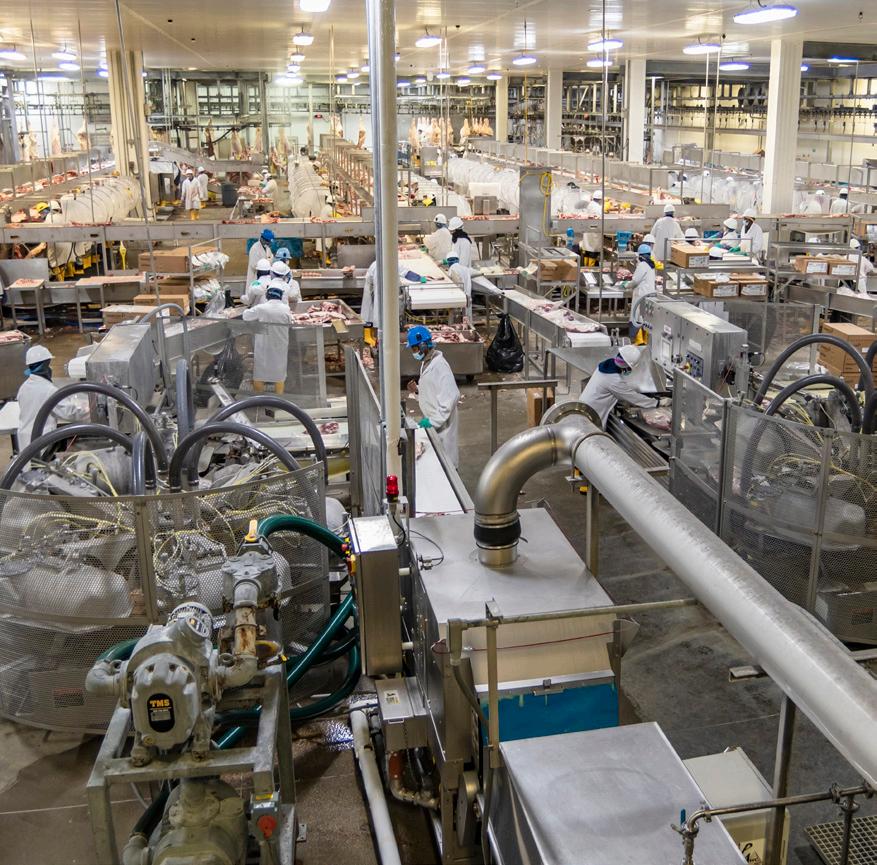
Employees from at least 18 different countries work together at DemKota, along with plenty of Aberdeen natives. Chief Operations Officer Adam Bode from Faulkton will tell you without hesitation that the thing he is most proud of the plant for is its people.
“Our people are invested in the success of the company, and we’re very much invested in them being successful as well. What we can accomplish and the quality of what we do all revolves around the people who work here. Our people are what make the company.”
He also credits his management team. White Oak Global of San Francisco owns the company, but as Adam explained, “DemKota is run locally here in Aberdeen.” They have about 800 people on staff, 97 percent of whom live in the Hub City and surrounding communities. The remaining few percent are sales team members who work remotely across the country.
DemKota has processed just over 300,000 head of cattle annually over the past two years. This number is significant because it shows they stayed within one percent of their 2019 production numbers in 2020, even with the ongoing pandemic. Very few beef packers experienced those same results. While they did reduce their volume by fifty percent for
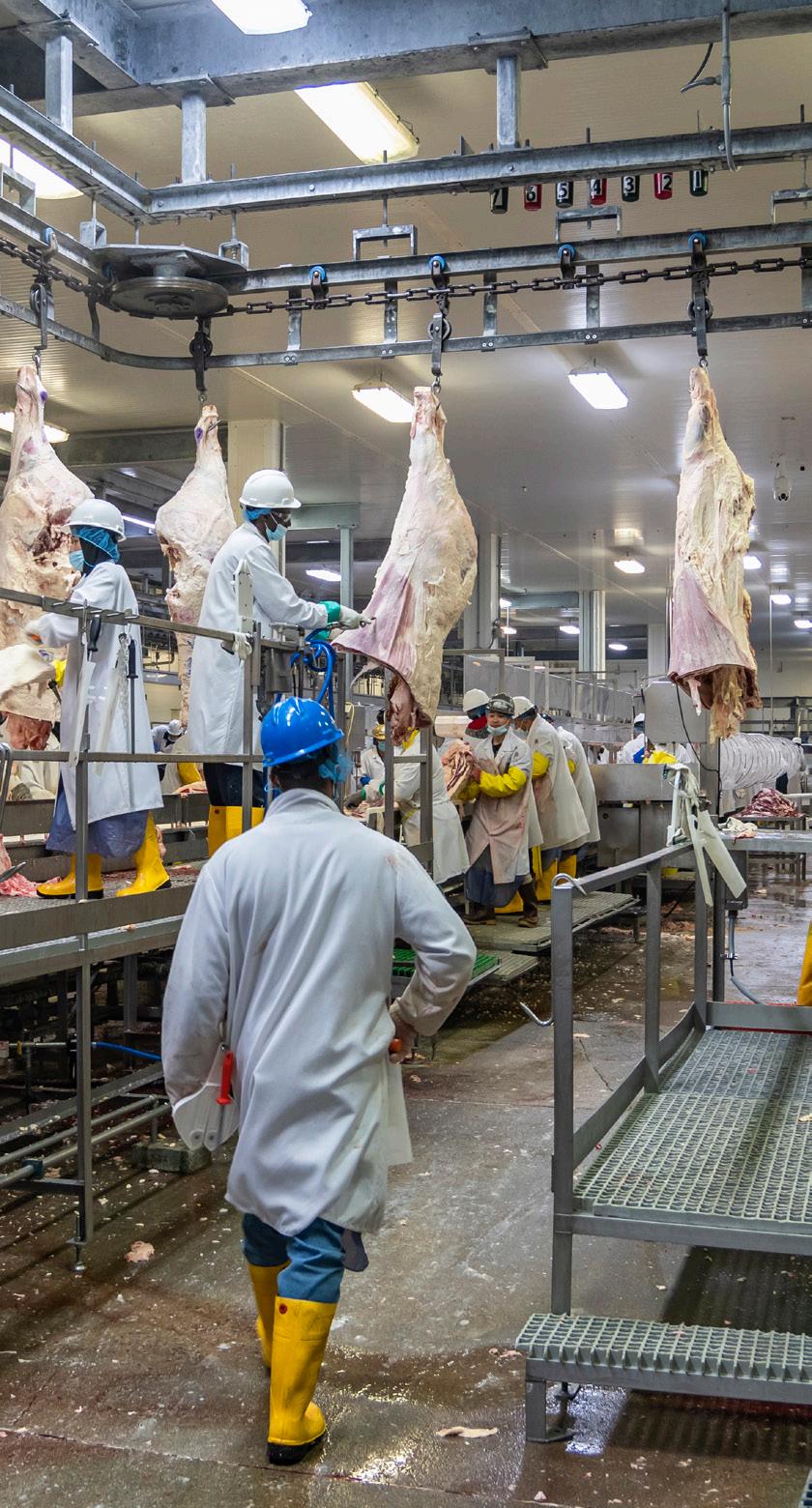
Every role on the production floor requires attention to detail, safety, and working together.
Chief Operations Officer Adam Bode credits DemKota employees for the beef processing plant’s continued success, especially during the pandemic.
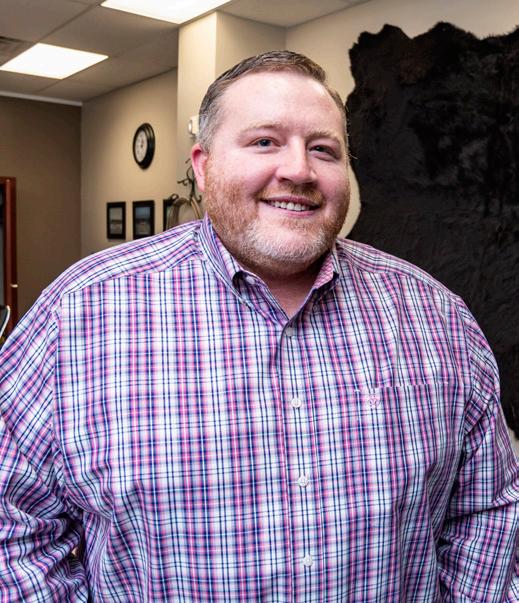
Pictured are department leadership members at DemKota Ranch Beef. The beef processing facility employs people from Aberdeen and at least 18 different countries.
a time during 2020, they always remained open and operational, and no one lost their job due to pandemic lay-offs. A noteworthy accomplishment for an industry hit hard by the virus.
“Our people are what made that possible,” Adam said. “We devoted a lot of resources toward keeping our staff safe, both in looking out for their physical safety and in creating policies to ensure no one would lose work if they became sick. But every person also brought a high level of individual commitment to follow the expert guidelines on staying healthy. That was huge. It’s all in the people you have working with you.”
As for the future, DemKota expects a ten percent growth projection for 2021. Meaning they’ll be able to partner with more local producers for supply or take in more volume from their current farmer partners. To do this, they’ll need to expand their staff even more. Currently, Adam said they have about 50 job openings. Positions at the company range from entrylevel and manufacturing floor roles to skilled tradesmen like electricians and plumbers, office and management staff, translators, security, and many other categories.
The supply of high-quality beef is here. We have the facility for packaging it. The challenge is finding enough employees to make it happen. Before COVID, the meat processing industry as a whole (including beef, pork, and poultry) estimated it was short by about 20,000 workers. So how do you find and keep employees in an industry that is short-staffed but also highly people-driven? Adam said DemKota always has initiatives to find workers, whether that’s a refugee from a foreign nation looking for a better life or a local looking for a new career.
“Perception is our biggest enemy. We recognize that we, and this whole industry, have essentially put up a wall when it comes to letting people in on what it’s like here to avoid being presented in a negative light. Processing an animal for food can be a delicate topic. But what has happened because of that wall is that it’s assumed it’s been put up to hide negative things, which is just simply not true. We have to try and change that image because there is an enormous amount of opportunity inside this business and inside these walls, and we have to do a better job of letting people in this region know about it,” he said.
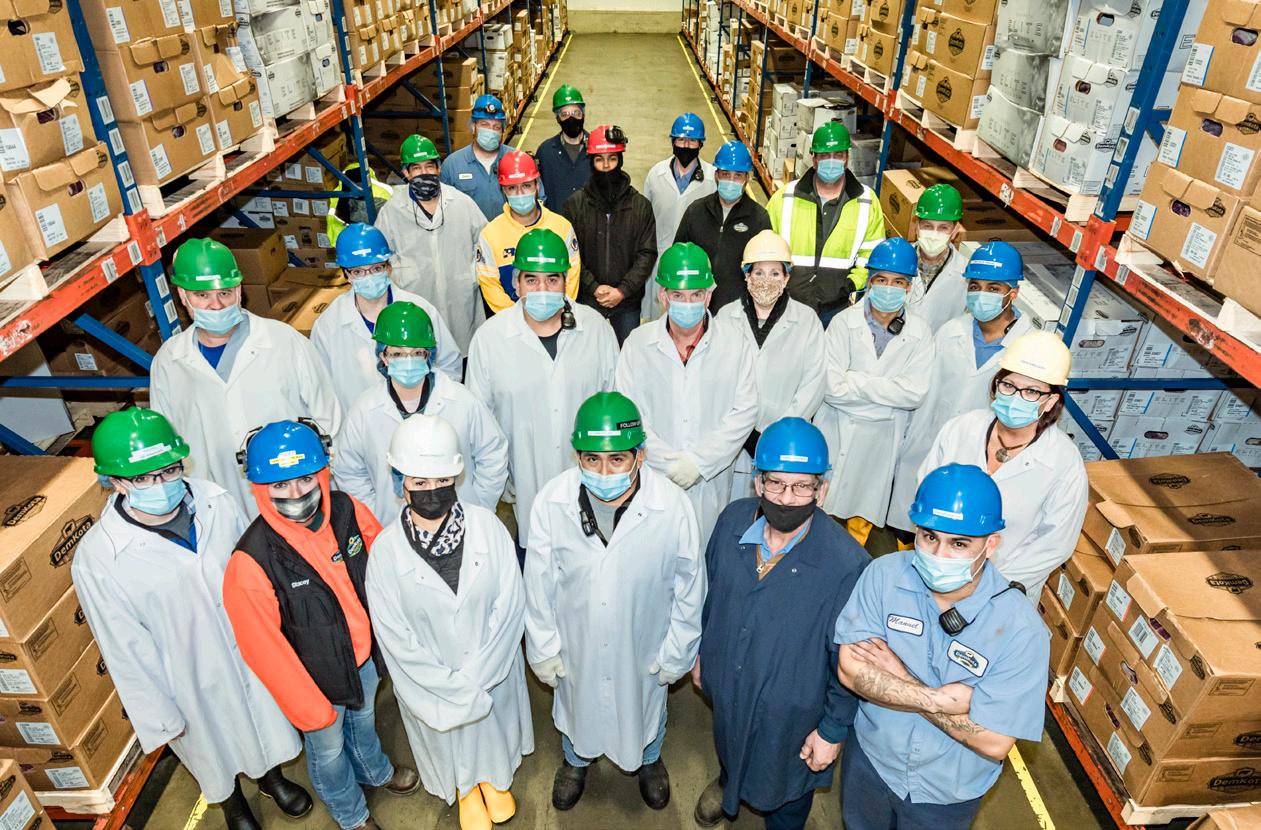
WITH PRODUCERS IN MIND
One way DemKota stands out from many beef packers is by offering a dual program for producers. Meaning they process both fed animals, young steers and heifers, as well as mature cows. Adam said, “We focus on the best-fed animals, but we also recognize cattle have a life cycle, and if the farmer-producer puts quality into their mature cows, we give them a marketing option for those as well. This is important because the average herd size of our producers is 163 head. When they have cattle at the end of their life cycle, we give them the option of putting additional value into them by feeding them a high-energy, corn-based diet and then selling them to us. This allows the producer to market both of their outputs, versus just the young, fed animals.”
These boxes of DemKota products are ready for consumption and will soon be landing in supermarkets and restaurants locally and worldwide. The plant was able to stay open and consistent with its production numbers throughout 2020.
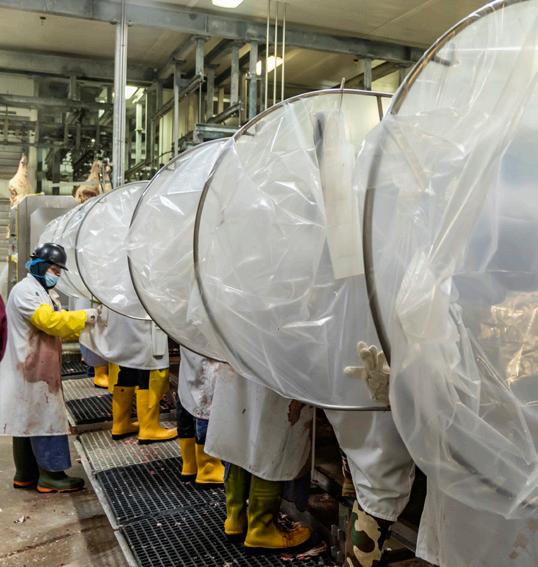

The opportunities he refers to here are for employees. A starting salary for an entry-level role is $16/hour, and for skilled tradesmen, “there is no income ceiling.” The company offers full benefits, full-time hours, and also an upcoming 30-hour, part-time shift that also includes full benefits. They are one of the top three largest employers in the region, and in the past two years, have paid over $100 million in payroll. Adam said, “We believe in local, and a significant portion of that payroll has to be contributing to Aberdeen’s businesses and local economy.”
Along with providing opportunities for their staff, DemKota is an opportunity for local cattle producers to sell their supply close to home. The next nearest beef plants of scale are in Iowa and Nebraska. It’s the producer’s responsibility to deliver their cattle to the processing plant, and Adam said DemKota gives them a chance to shorten their supply chain and lower expenses. Over the past two years, they have bought over $800 million in cattle, most of which are located within three hours of the facility and from familyowned farms.
Walking through the plant, Adam pointed out the characteristics of a ribeye that let you know by just a glance that it’s an exceptional product. His voice lit up when explaining the quality of beef that comes through DemKota. As a girl raised by cattle farmers, I’ve had a front-row seat to everything local producers put into raising their animals, so I admit, I felt a lot of pride here too.

Since COVID, DemKota employees have been adhering to even more work safety guidelines. The plastic screens you see here help with social distancing measures.



“The supply network of quality beef in this region is why a facility like DemKota came to be here in the first place,” Adam said. They connect the supply from local farmers to local and global sources. Ken’s SuperFair Foods has the retail footprint on DemKota products, while Cash-Wa has the foodservice footprint, selling to establishments such as Mavericks, Minervas, and Moccasin Creek Country Club, to name a few. But, Adam explained, there aren’t enough consumers in Aberdeen to eat one day’s worth of DemKota’s beef production in a year. This is where national and international customers come in.
“International consumers are typically looking for a high-quality product, and we fit that bill very well,” Adam said.
As part of an industry that has traditionally been marked as intimidating, DemKota realizes they have work to do to change that image into one of opportunity. They’re more than up for the task.
“We want to connect that high-quality supply from our local producers to consumers, and in doing that, provide opportunity for the individuals who work here to have a fulfilling career that supports their family, and in turn, benefits the community as a whole. That’s what we plan to continue to do,” Adam said. //


THE LARGEST SELECTION OF FOOTWEAR IN THE REGION
605.225.5111 | 3315 E 6th AVE, Aberdeen Mall facebook.com/shoescienceaberdeen instagram.com/shoesciencesd
A boutique and metaphysical store dedicated to the eclectics.

in the Aberdeen Mall
Wednesday - Friday: 10 am-8 pm Saturday: 10 am-7 pm | Sunday: 12 pm-5 pm










